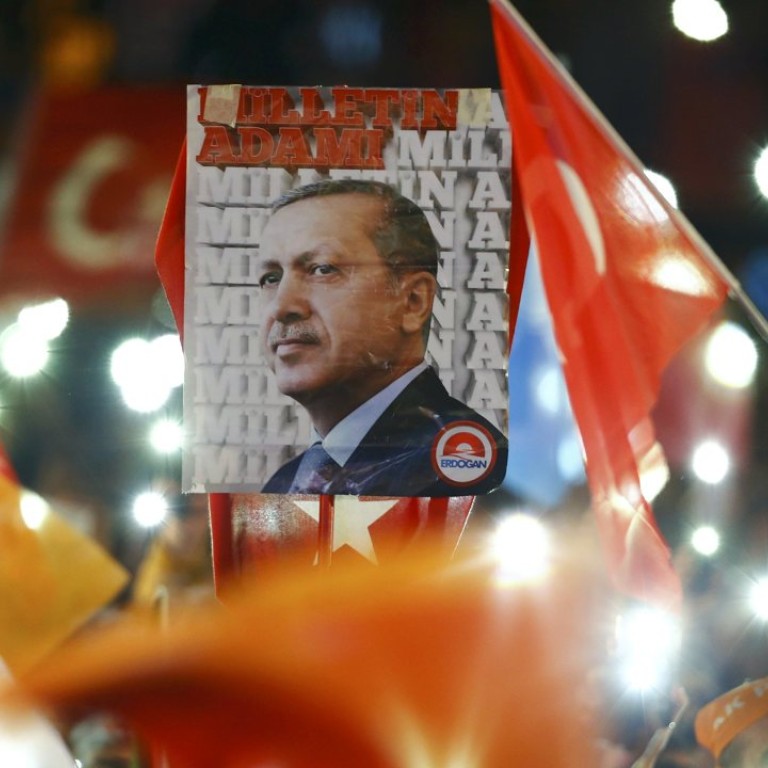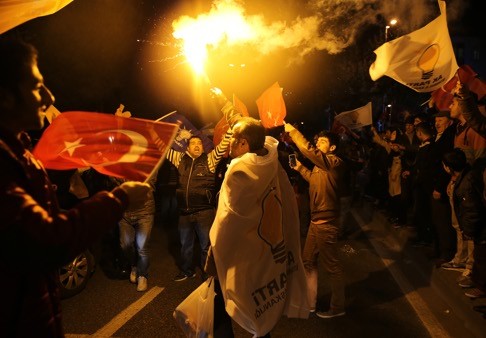
Turkey returns to single-party rule as election delivers big boost for Erdogan
Turkey’s Islamist-rooted AK Party swept to an unexpected victory in elections on Sunday, returning the country to single-party rule in an outcome that will boost the power of President Tayyip Erdogan but may sharpen deep social divisions.
With almost all ballots counted, the AKP had taken just shy of 50 per cent of the votes, comfortably enough to control a majority in the 550-seat parliament and a far higher margin of victory than even party insiders had expected.
Prime Minister and AKP leader Ahmet Davutoglu tweeted simply “Elhamdulillah” (Thanks be to god), before emerging from his family home in the central Anatolian city of Konya to briefly address crowds of cheering supporters.

At AKP headquarters in Ankara, under a sky lit by fireworks, he later urged Turkey’s political parties to work together on a new constitution, which Erdogan has said he would like to s eeinclude executive powers for the presidency.
A senior official from the main CHP opposition, which hadcalculated on “reining in” Erdogan’s influence with a coalition government, described the result as “simply a disaster”.
The outcome could aggravate deep splits in Turkey between pious conservatives who champion Erdogan as a hero of the working class, and Western-facing secularists suspicious of his authoritarianism and Islamist ideals.
In the mainly Kurdish southeastern city of Diyarbakir, security forces fired tear gas at stone-throwing protesters after support for the pro-Kurdish opposition fell perilously close to the 10 percent threshold needed to enter parliament.
In June, the AKP lost the overall majority it had enjoyed since 2002. Erdogan had presented Sunday’s polls as a chance to restore stability at a time of tension over Kurdish insurrection and after two bombings, attributed to Islamic State, while critics fear a drift to authoritarianism under the president.
With 99 percent of votes counted, the AKP was on 49.4 per cent, according to state-run broadcaster TRT, giving it 316 of parliament’s 550 seats. The main opposition CHP was at 25.4 per cent and a senior official said any hopes of a coalition now looked all but impossible.
Erdogan’s crackdowns on media freedoms and tightening grip on the judiciary, following a corruption investigation that was shut down as an attempt to overthrow him, have alarmed European leaders. A large number of journalists and others have faced court proceedings for “insulting the president”.
Foreign capitals as well as Turkish media and other organisations will be watching closely for signs of whether a harsh climate will continue or government relaxes its grip.
Erdogan and the AKP have been fierce critics, for example, of US support for Kurdish militia fighters battling Islamic State (IS) across Turkey’s border in Syria.
“This (result) makes more difficult a strategy of using the Kurds against IS because AKP appeals to anti-Kurd sentiments,” said Bruce Riedel, a former CIA analyst and sometime policy advisor to US President Barack Obama.
Erdogan, Turkey’s most powerful leader in generations, resigned as prime minister last year and became Turkey’s first directly elected president - with the aim of transforming it from a largely ceremonial position to a strong executive post.
The AKP still lacks a majority big enough to change the constitution. But being the sole party in power, Erdogan will beable to reassert his influence over government from the grandeur of his newly built presidential palace.
